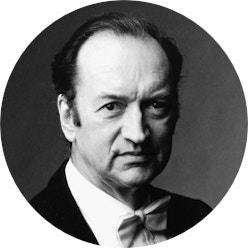
Nikolaus Harnoncourt
December 6, 1929 - Berlin (Germany) — March 5, 2016
About
Nikolaus Harnoncourt was born in Berlin in 1929 and grew up in Graz, Austria. He studied cello with Paul Grümmer and at the College of Music in Vienna with Emanuel Brabec. From 1952 to 1969 he was a member of the Vienna Symphony Orchestra. His principal interest during that time was acquainting himself with the performance practice of music of the Renaissance through to the Classical era and learning the playing technique and sound possibilities of period instruments. To this end, in 1953, Nikolaus Harnoncourt founded the "Concentus Musicus" ensemble, which gave its first public performance in 1957. This was followed shortly afterwards by commercial recordings of repertoire ranging from 1200 to 1800. The central point in this work was the entire cantata output of J.S. Bach, which developed into a recording project spanning almost 20 years, in collaboration with Gustav Leonhardt. Since the 1978/79 season, Nikolaus Harnoncourt has been directing his own Concentus Musicus cycle for the Gesellschaft der Musikfreunde in Vienna.
While in the early years Harnoncourt was seen as a specialist for Renaissance and Baroque music, a label he did not relish, he did later perform works from the Classical and Romantic eras. Since 1985 he has been regularly involved in the annual Styriarte Festival in Graz, which he helps to plan. At that event, he has repeatedly performed and recorded whole cycles of works by Haydn, Beethoven, Schumann, Schubert, Mendelssohn and Brahms with the Chamber Orchestra of Europe.
He is a regular guest conductor, especially with the Royal Dutch Concertgebouw Orkest of Amsterdam, and the Vienna and Berlin Philharmonic orchestras. Nikolaus Harnoncourt's first opera production was Monteverdi's Il ritorno d’Ulisse in patria at the Theater an der Wien in 1971. Shortly afterwards, he embarked upon a mutually successful collaboration with Jean-Pierre Ponnelle at the opera house in Zurich. Following the highly acclaimed Monteverdi cycle, performed between 1975 and 1979 in the most important centres of music in Europe (Edinburgh, Milan, Vienna, Berlin, Munich), there followed the Mozart cycle, from 1980 to 1987. Nikolaus Harnoncourt has retained his close ties to the Zurich opera house to this day. New productions which he has directed at the Vienna State Opera, at the opera house in Amsterdam and at other venues, presented works by Handel, Rameau, Haydn, Mozart, Beethoven, Schubert, Weber and Johann Strauss. Nikolaus Harnoncourt's involvement with opera is well documented on numerous recordings.
Nikolaus Harnoncourt's career as a conductor both in the field of the symphonic repertoire and in musical theatre has led via the Viennese Classical era through the Romantic repertoire into the twentieth century. Just a few stations on his career path include a Mozart cycle with the Vienna State Opera, and Monteverdi's L'incoronazione di Poppea and Mozart's The Marriage of Figaro, Don Giovanni and La clemenza di Tito for the Salzburg Festival. In between these milestones he frequently spent time in Zurich, directing productions including Weber's Der Freischütz, Schubert's Des Teufels Lustschloss and Alfonso und Estrella, Offenbach's La belle Hélène, La Périchole and La Grande-Duchesse de Gérolstein, and Verdi's Aida.
In the field of orchestral work, Nikolaus Harnoncourt has built up and in some cases rediscovered a vast repertoire with the Concertgebouw Orkest of Amsterdam, the Chamber Orchestra of Europe, and the Vienna and Berlin Philharmonic Orchestras. This repertoire ranges from Haydn, Mozart and Beethoven by way of Schubert, Mendelssohn, Schumann, Brahms, Dvorák and Bruckner through to Bela Bartók and Alban Berg.
The focal venue for many of these projects was and is the Styriarte festival, founded in 1985 in Graz, which links Nikolaus Harnoncourt more closely to his home city. That is where he has conducted many works, including the first performance of Schumann's Genoveva, the overture and the dramatic death of the lovers from Wagner's Tristan and Isolde and in 2001 Verdi's Requiem. 2003 saw the performance of his first opera in the form of Offenbach's La Grande-Duchesse de Gérolstein. Yet another highlight was the staged performance of Bizet's Carmen at the Styriarte in 2005.
Harnoncourt has also endeavoured, as the author of a number of acclaimed books translated into over 20 languages, to impart his views on the element of dialogue in music, and to pass on his knowledge as a teacher. For twenty years, he taught as a professor of performing practice at the Mozarteum University of Music in Salzburg.
His work has been honoured with numerous international awards. Nikolaus Harnoncourt is an honorary member of the Gesellschaft der Musikfreunde (society of the friends of music) and the Konzerthausgesellschaft (concert house society) in Vienna (since 1992); he holds an honorary doctorate from the University of Edinburgh and from the Mozarteum in Salzburg, and is also an honorary member of the universities of music in Graz and Vienna. In 2002 he was awarded the Ernst von Siemens Music Prize and the Polar Prize in Stockholm, while in 2005 he received the Kyoto Prize, the world's most important independent arts prize awarded to outstanding international personalities from the fields of the arts and science.
Nikolaus Harnoncourt's discography comprises almost 500 recordings, many of which have won all of the main international classical music prizes including a GRAMMY® for his version of the St Matthew Passion. His most recent prize is the 2006 ECHO KLASSIK award for his recording of Messiah together with the Arnold Schoenberg Choir and Concentus Musicus Vienna (82876640702 dhm/SONY Masterworks).

